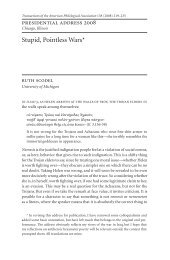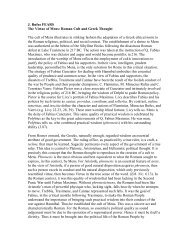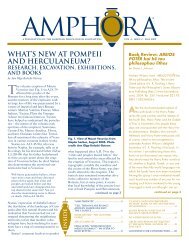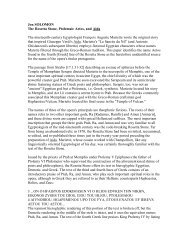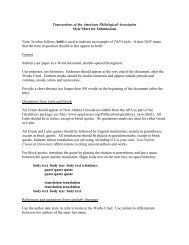classics rewritten in stone: the art of anita huffington - American ...
classics rewritten in stone: the art of anita huffington - American ...
classics rewritten in stone: the art of anita huffington - American ...
Create successful ePaper yourself
Turn your PDF publications into a flip-book with our unique Google optimized e-Paper software.
moment is Hermione’s upstag<strong>in</strong>g <strong>of</strong> her<br />
peers <strong>in</strong> her comb<strong>in</strong>ation <strong>of</strong> proper technique<br />
– “swish and flick” – and enunciation<br />
<strong>in</strong> her superior execution <strong>of</strong><br />
“w<strong>in</strong>gardium leviosa!” She scolds Ron,<br />
“You’re say<strong>in</strong>g it wrong . . . “It’s W<strong>in</strong>ggar-dium<br />
Levi-o-sa, make <strong>the</strong> ‘gar’ nice<br />
and long” (SS 10). The voces magicae <strong>of</strong><br />
<strong>the</strong> ancient PGM and lead tablets (magical<br />
words like ablanathanalba, borphorbabarbor,<br />
and maskelli maskello)<br />
might be compared with parseltongue<br />
(<strong>the</strong> specialized wizard<strong>in</strong>g ability, limited<br />
primarily to those <strong>of</strong> Sly<strong>the</strong>r<strong>in</strong> l<strong>in</strong>eage,<br />
to speak <strong>in</strong> <strong>the</strong> language <strong>of</strong> snakes,<br />
e.g., SS 2 and Chamber <strong>of</strong> Secrets [CS] 11).<br />
The potion book <strong>of</strong> <strong>the</strong> Half-Blood<br />
Pr<strong>in</strong>ce (HBP) is a p<strong>art</strong>icularly good illustration<br />
<strong>of</strong> how Greco-Roman grimoires<br />
might have been <strong>the</strong> accretion <strong>of</strong> several<br />
users’ tweak<strong>in</strong>g <strong>of</strong> magical recipes. In a<br />
race to create <strong>the</strong> best Draught <strong>of</strong> Liv<strong>in</strong>g<br />
Death <strong>in</strong> order to w<strong>in</strong> a swig <strong>of</strong><br />
Felix Felicis potion, Harry must use an<br />
old borrowed potions book. Overcom<strong>in</strong>g<br />
his irritation at <strong>the</strong> “stupid scribbles <strong>of</strong><br />
<strong>the</strong> previous owner, who for some reason<br />
had taken issue with <strong>the</strong> order to<br />
cut up <strong>the</strong> sopophorous bean and had<br />
written <strong>in</strong> <strong>the</strong> alternative <strong>in</strong>struction:<br />
crush with flat side <strong>of</strong> silver dagger,<br />
releases juices better than cutt<strong>in</strong>g,”<br />
Harry eventually uses those revisions<br />
with success (HBP 9). Similar to <strong>the</strong><br />
Half-Blood Pr<strong>in</strong>ce’s adaptations, scholars<br />
have noted <strong>the</strong> accretive element <strong>of</strong><br />
spell books <strong>in</strong> <strong>the</strong> multiple hands and<br />
range <strong>of</strong> ad hoc spells <strong>in</strong> many <strong>of</strong> <strong>the</strong><br />
grimoires (LiDonnici 2003). Fur<strong>the</strong>r,<br />
just as root-cutt<strong>in</strong>g and herb-knowledge<br />
were magical skills <strong>in</strong> antiquity (Scarborough<br />
1991), Snape grills Harry on his<br />
herbological understand<strong>in</strong>g <strong>of</strong> <strong>the</strong> properties<br />
<strong>of</strong> asphodel and wormwood,<br />
monkshood and wolfsbane (SS 8); we<br />
learn <strong>the</strong> importance <strong>of</strong> gillyweed (GF<br />
26); and we are taught that venom <strong>of</strong><br />
acromantula is a precious <strong>in</strong>gredient, its<br />
rarity due to <strong>the</strong> difficulty <strong>of</strong> ga<strong>the</strong>r<strong>in</strong>g<br />
it (HBP 22).<br />
Agonistic Context <strong>of</strong> Magic<br />
Struggle – between good and evil,<br />
Harry and Voldemort, <strong>the</strong> world <strong>of</strong><br />
Muggles (people with no magical abilities)<br />
and Magicians – is at <strong>the</strong> he<strong>art</strong> <strong>of</strong><br />
<strong>the</strong> Potter series. Defense aga<strong>in</strong>st <strong>the</strong><br />
Dark Arts is a recurr<strong>in</strong>g <strong>the</strong>me <strong>in</strong> <strong>the</strong><br />
books, whe<strong>the</strong>r as <strong>the</strong> much coveted (at<br />
least by Snape) teach<strong>in</strong>g position at<br />
Hogw<strong>art</strong>s, <strong>the</strong> purpose <strong>of</strong> Occlumency,<br />
or <strong>the</strong> goal <strong>of</strong> Dumbledore’s Army.<br />
Magic <strong>in</strong> Potterworld is <strong>in</strong>extricably<br />
bound with <strong>the</strong> concept <strong>of</strong> struggle, or<br />
agon as <strong>the</strong> Greeks would have called it.<br />
Chris Faraone (1991) has illustrated<br />
well <strong>the</strong> agonistic context <strong>of</strong> Greco-<br />
Roman magic, namely that magic was<br />
<strong>of</strong>ten used <strong>in</strong> competitive situations<br />
such as bus<strong>in</strong>ess, <strong>the</strong>atre, legal cases,<br />
athletics, and love, especially when <strong>the</strong><br />
outcome was <strong>in</strong> question. The j<strong>in</strong>x<br />
placed on Harry’s broom dur<strong>in</strong>g a Quidditch<br />
match <strong>in</strong> SS 11 is rem<strong>in</strong>iscent <strong>of</strong> a<br />
Rowl<strong>in</strong>g’s portrayal<br />
<strong>of</strong> magic reflects ancient<br />
practices.<br />
seventy-five l<strong>in</strong>e lead curse tablet from<br />
North Africa that b<strong>in</strong>ds horses – “take<br />
away <strong>the</strong>ir victory, entangle <strong>the</strong>ir feet,<br />
h<strong>in</strong>der <strong>the</strong>m, hobble <strong>the</strong>m . . .” – and<br />
<strong>the</strong>ir drivers – “snatch <strong>the</strong>m up from<br />
<strong>the</strong>ir chariots and twist <strong>the</strong>m to <strong>the</strong><br />
ground . . . dragged along all over <strong>the</strong><br />
hippodrome . . . with damage to <strong>the</strong>ir<br />
body” (Defixionum Tabellae 237, trans. <strong>in</strong><br />
Gager 61-2). Just as <strong>the</strong> Potter-reader<br />
discovers that Pr<strong>of</strong>. Snape was not j<strong>in</strong>x<strong>in</strong>g<br />
Harry, but <strong>in</strong>stead was mutter<strong>in</strong>g a<br />
protective spell on Harry’s behalf, one<br />
f<strong>in</strong>ds <strong>in</strong> PGM 3.15-30 a recipe for a protection<br />
spell: “I adjure you angels <strong>of</strong><br />
runn<strong>in</strong>g . . . that you will gird with<br />
strength and courage <strong>the</strong> horses that<br />
NN is rac<strong>in</strong>g and his charioteer . . . let<br />
no o<strong>the</strong>r magic or witchcraft affect<br />
<strong>the</strong>m.” The effectiveness <strong>of</strong> Harry’s<br />
pretense <strong>of</strong> slipp<strong>in</strong>g his Felix Felicis<br />
potion to Ron prior to <strong>the</strong> latter’s Quidditch<br />
success <strong>in</strong> HBP (14-5) illustrates<br />
how it is that many have suggested<br />
Greco-Roman magic would have<br />
“worked” <strong>in</strong> <strong>the</strong>se competitive situations<br />
– that it gave to <strong>the</strong> user an edge<br />
<strong>in</strong> confidence.<br />
Agonistic parallels cont<strong>in</strong>ue <strong>in</strong> <strong>the</strong><br />
use <strong>of</strong> love potions, both <strong>in</strong> antiquity<br />
and <strong>in</strong> Potterworld. Love spells from<br />
antiquity abound both <strong>in</strong> formulae preserved<br />
<strong>in</strong> recipe books and etched on<br />
lead. They are <strong>the</strong> source <strong>of</strong> fictional<br />
humor, as when goat corpses rush<br />
through <strong>the</strong> streets at <strong>the</strong> behest <strong>of</strong> <strong>the</strong><br />
witch Pamphile’s magical m<strong>in</strong>istrations<br />
after she has been duped by her slave<br />
Photis <strong>in</strong>to us<strong>in</strong>g goat hairs <strong>in</strong>stead <strong>of</strong><br />
<strong>the</strong> hair <strong>of</strong> <strong>the</strong> <strong>in</strong>tended victim<br />
(Apuleius, Metamorphoses 3.16-8); but<br />
this is a humor that is based <strong>in</strong> a genu<strong>in</strong>e<br />
social concern over subversive erotic<br />
matches. While <strong>the</strong>re are debates about<br />
how <strong>the</strong>se spells “worked” <strong>in</strong> <strong>the</strong>ir<br />
Greco-Roman context, with J. W<strong>in</strong>kler<br />
(1990) champion<strong>in</strong>g a <strong>the</strong>rapeutic psychological<br />
projection model and Faraone<br />
(1999) suggest<strong>in</strong>g ra<strong>the</strong>r that <strong>the</strong> spells<br />
re-<strong>in</strong>scribed <strong>the</strong> realities <strong>of</strong> matchmak<strong>in</strong>g,<br />
<strong>the</strong>re can be no doubt about <strong>the</strong><br />
popularity <strong>of</strong> love spells <strong>of</strong> all varieties:<br />
men pursu<strong>in</strong>g men and women, women<br />
pursu<strong>in</strong>g women and men.<br />
As <strong>the</strong> protagonists <strong>of</strong> <strong>the</strong> Potter<br />
series age, <strong>the</strong>ir concerns mature as<br />
well. While Quidditch is <strong>the</strong> major competitive<br />
context <strong>of</strong> <strong>the</strong> first book, love<br />
becomes a greater concern <strong>in</strong> <strong>the</strong> later<br />
books <strong>of</strong> <strong>the</strong> series. In HBP, love<br />
potions are not only <strong>the</strong> source <strong>of</strong> comic<br />
relief but also a major plot po<strong>in</strong>t. We are<br />
rem<strong>in</strong>ded <strong>of</strong> Apuleius’ bewitched goat<br />
corpses when Ron consumes Chocolate<br />
Frogs laced with a love charm meant for<br />
Harry (HBP 18-9). More seriously,<br />
Voldemort himself is <strong>the</strong> <strong>of</strong>fspr<strong>in</strong>g <strong>of</strong> a<br />
relationship brought about by <strong>the</strong> spell<br />
his witch mo<strong>the</strong>r Merope (note <strong>the</strong><br />
resonance <strong>of</strong> <strong>the</strong> name with Apuleius’<br />
famous lead<strong>in</strong>g witch Meroe) cast on<br />
<strong>the</strong> Muggle Tom Riddle. A pregnant<br />
Merope is left to raise her half-blood<br />
son alone and <strong>in</strong> shame, when <strong>the</strong> love<br />
spell wears <strong>of</strong>f and Riddle scorns her<br />
(HBP 10-1). Such a situation is perhaps<br />
what Domitiana feared <strong>in</strong> third-century<br />
C.E. North Africa when she commissioned<br />
what Faraone would call a philia<br />
spell to “br<strong>in</strong>g Urbanus . . . and unite<br />
him with Domitiana . . . <strong>in</strong> marriage as<br />
spouses <strong>in</strong> love for all <strong>the</strong> time <strong>of</strong> <strong>the</strong>ir<br />
lives” (DT 271, trans. <strong>in</strong> Gager, 112-5).<br />
Indeed, such erotic spells <strong>of</strong>ten had<br />
time-limits, as we are rem<strong>in</strong>ded by <strong>the</strong><br />
odd fifth-century C.E. love spell <strong>in</strong><br />
which Theon, a male, seeks to b<strong>in</strong>d to<br />
himself Euphemia, “with love and lust<br />
and long<strong>in</strong>g for ten months from today”<br />
. . . just long enough to br<strong>in</strong>g a pregnancy<br />
to term (Supplementum Magicum 45).<br />
O<strong>the</strong>r Connections?<br />
Illustrative parallels cont<strong>in</strong>ue well<br />
beyond magical knowledge and ritual<br />
expertise or <strong>the</strong> agonistic context <strong>of</strong><br />
sport and love. Rowl<strong>in</strong>g’s animagi, who<br />
use magic to become animals – Sirius<br />
Black/Padfoot, James Potter/Prongs,<br />
Peter Pettigrew/Wormtail, and Rita<br />
Skeeter/Beetle and <strong>the</strong> Metamorphmaga<br />
Nymphadora Tonks (Order <strong>of</strong> <strong>the</strong> Phoenix<br />
[OP] 3) – call to m<strong>in</strong>d <strong>the</strong> shape-shift<strong>in</strong>g<br />
Lucius, <strong>the</strong> lead character <strong>of</strong> Apuleius’<br />
Metamorphoses who transforms <strong>in</strong>to a<br />
donkey after his misapplication <strong>of</strong><br />
cont<strong>in</strong>ued on page 23<br />
21



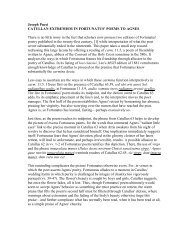
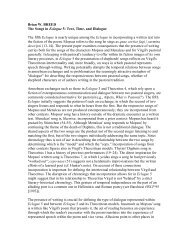
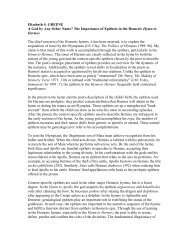
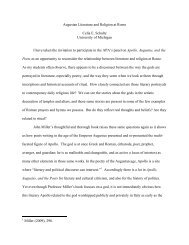
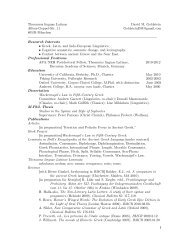
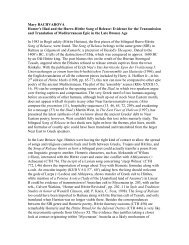
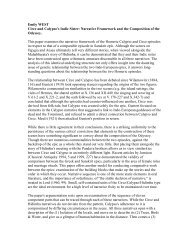
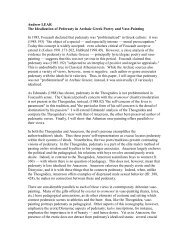
![John H. STARKS, Jr. [vo]cales vultus:Pantomime Actresses in Latin ...](https://img.yumpu.com/11930335/1/190x245/john-h-starks-jr-vocales-vultuspantomime-actresses-in-latin-.jpg?quality=85)
